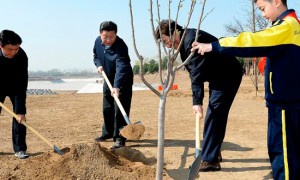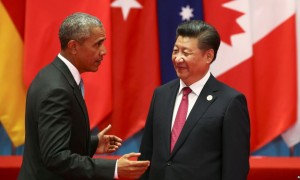demolish, break, destroy, ruin
这组词都含有“破坏”“毁坏”“消灭”的意思。它们的区别在于:
1.destroy和ruin这两个词所表示的“毁坏”都含有“彻底”的意味,有时可互换。destroy强调“彻底性”; ruin强调不可修复。例如:
The rain has ruined〔destroyed〕 the crops.这雨把庄稼全毁了。
2.break, destroy和demolish的主语可以是人,也可以是事物; 而ruin的主语多为天灾人祸等无形的力量。例如:
The windshield broke but did not shatter.挡风玻璃裂了,但没有碎。
All the intruders were destroyed.所有的入侵者都被歼灭了。
That street was demolished a few years ago.那条街于几年前拆除了。
She has a very real grievance against the hospital since the operation which ruined her health.自从她做过手术后,健康状况变坏,所以她确实对医院有怨言。
3.break的宾语可以是有形物,也可以是非物质性的事物; destroy和demolish用于具体事物可指“高楼大厦”等; 用于抽象事物时destroy指“名誉”“声望”等, demolish则指某人的论点、论据等。ruin的宾语则多是美好珍贵的事物。例如:
His mother's heart will break if he leaves her.如果他离开母亲,她的心会碎的。
All his hopes were now destroyed.他的一切希望现在都破灭了。
We have demolished all her arguments and she has nothing more to say.我们推翻了她所有的论点,她无言以对。
The manuscript was ruined by long exposure in the cold damp cellar.手稿在地下室因长期受阴冷潮湿的破坏而无法辨认了。
4.break可用作及物动词,也可用作不及物动词; destroy和demolish只用作及物动词; 而ruin多用作及物动词,偶尔可用作不及物动词。例如:
She broke a vase uncarefully.她不小心打破了一只花瓶。
The cup broke when it fell on the floor.茶杯掉到地上摔破了。
The mad dog ought to be destroyed.这只疯狗应该杀死。
They are going to demolish that old factory.他们准备拆毁那家旧工厂。
I was ruined by that law case; I'm a ruined man!我被那场官司搞垮了,现在已经倾家荡产!
demolish, damage, ruin, spoil
这组词都有“破坏,毁坏”的意思。它们的区别是:
1.damage一般指“部分的破坏”,通常作“损坏”解,意味着损坏后价值减少或作用减小,有时可用于借喻中。
2.demolish是正式用语,指由于巨大外力或急速、猛烈的动作而造成的破坏,其破坏力甚至达到粉碎的程度,往往只剩下一堆废墟或残骸。例如:
Many buildings had to be demolished before the new highway could be built.必须拆毁许多建筑物才能修建新公路。
The car was demolished in a collision.汽车撞坏了。
3.ruin指把某件东西损害到不能再修理或使用的程度。现在多用于借喻中。例如:
Your plans for a party will be ruined if you get sick.如果你病了,你的聚会计划就毁了。
Moths ruined good woolen clothes by eating holes in them.蛀虫在很好的毛衣上咬了许多洞,把衣服给毁了。
4.spoil一般指某物受到严重破坏或损伤,基本上失去原有的价值、用途、美观,一般含有不可弥补的意味,作不及物动词用,表示(食物)变坏,腐烂变质等。例如:
Too much pepper spoiled the soup she was making for supper.她在晚餐所做的汤里放了过多的胡椒,破坏了汤的味道。










